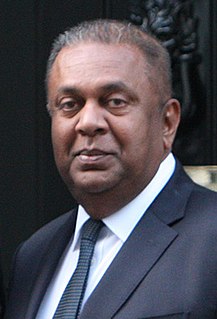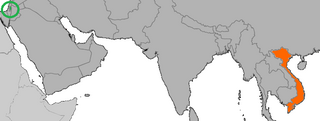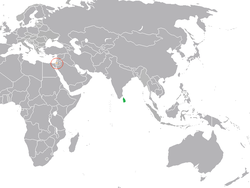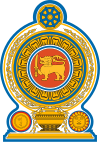
Chandrika Bandaranaike Kumaratunga is a Sri Lankan politician who served as the fifth President of Sri Lanka, from 12 November 1994 to 19 November 2005. The country's only female president to date, she is the daughter of two former prime ministers and was the leader of the Sri Lanka Freedom Party (SLFP) until the end of 2005.

The Sri Lanka Freedom Party is one of the major and most well known political parties in Sri Lanka. It was founded by S.W.R.D Bandaranaike in 1951 and, since then, has been one of the two largest parties in the Sri Lankan political arena. It first came to power in 1956 and since then has been the predominant party in government on a number of occasions. The party is generally considered as having a democratic socialist or progressive economic agenda and is often associated with nationalist Sinhalese parties. The party follows a Non-Aligned foreign policy but always had close ties to socialist nations. The Sri Lanka Freedom Party is a Second Main constituent party in the Sri Lanka People's Freedom Alliance.

Mangala Pinsiri Samaraweera was a Sri Lankan politician. He was the first openly gay politician from Sri Lanka. He was the Minister of Finance from 2017 to 2019, and the Minister of Foreign Affairs, for two terms from 2005 to 2007 and 2015 to 2017. He created a stir in Sri Lankan politics when he was sacked as a minister by President Mahinda Rajapakse in 2007, after which he formed a new political party called the Sri Lanka Freedom Party (Mahajana) Wing, which later merged with the United National Party in 2010.

The Islamic Republic of Iran officially recognises Palestine as a state. Ali Khamenei, the Supreme Leader of Iran, rejects a two-state solution and implies that Palestine is inseparable, while Iran's former President Mahmoud Ahmadinejad called for a free referendum for the entire Palestinian population, including Arab citizens of Israel, to determine the type of government in the future Palestinian State, while reiterating that establishment of a Palestinian State alongside Israel would "never mean an endorsement of the Israeli occupation".

In a 2005 BBC World Service Poll, 30% of Sri Lankans view American influence positively, with 20% expressing a negative view. According to the 2012 U.S. Global Leadership Report, 14% of Sri Lankans approve of U.S. leadership, with 37% disapproving and 49% uncertain.

Pakistan–Sri Lanka relations refer to bilateral relations between Pakistan and Sri Lanka. Both countries are located in South Asia. The earliest proper diplomatic and trade contacts between Pakistan and Sri Lanka date back as early as 1948. In 2013, the then prime minister Nawaz Sharif said that there were strong bonds of friendship between the two countries.

Japan–Sri Lanka relations refers to the bilateral relations between the Sri Lanka and Japan.

The Holy See has maintained relations with Palestine since 11 February 1948, when the Holy See created the office of Apostolic Delegate to Jerusalem and Palestine, with jurisdiction over Palestine, Transjordania, and Cyprus. In Vatican usage, an Apostolic Delegate is a representative of the Vatican in a country with which the Holy See has no diplomatic ties, and who is not accredited to the government of the country. The Delegate also acts as a liaison with the Catholic Church in that country.

Pallewatte Gamaralalage Maithripala Yapa Sirisena is a Sri Lankan politician, who served as the seventh President of Sri Lanka from 9 January 2015 to 18 November 2019. Sirisena is Sri Lanka's first president from the North Central Province of the country and does not belong to the traditional Sri Lankan political elite. He is currently a member of parliament from Polonnaruwa.

Russia–Palestine relations is the bilateral relationship between the Russian Federation and the State of Palestine.

The history of Sri Lanka from 1948 to the present is marked by the independence of the country through to Dominion and becoming a Republic. The main factor has been conflict and civil war regarding the status of minority Tamils.

China–Palestine relations, also referred to as Sino–Palestinian relations, encompasses the long bilateral relationship between China and Palestine dating back from the early years of the Cold War.

Relations between the United States of America and Palestinians are complex and strained. The United States does not recognize the State of Palestine, but accepts the Palestine Liberation Organization (PLO) as a representative of the Palestinian people and the Palestinian National Authority as the authority legitimately governing the Palestinian territories under the Oslo Accords.

Relations between Vietnam and the Palestine have been strong and very friendly. Vietnam had established very close relations with the Palestine Liberation Organization (PLO) and was one of the first countries to recognize the State of Palestine.

China–Sri Lanka relations are the bilateral relations between the People's Republic of China and Democratic Socialist Republic of Sri Lanka. There is a Chinese embassy located in Colombo and a Sri Lankan embassy situated in Beijing. Historical and cultural ties between the two countries extend back hundreds of years.

Bilateral relations between Bangladesh and Palestine are close and considered to be cordial. Bangladesh has been a consistent supporter of the Palestinian campaign for an independent state, and has no diplomatic relations with Israel. Furthermore, Bangladesh offers scholarships to young Palestinians, and the two countries co-operate on military affairs.

Presidential elections were held in Sri Lanka on 16 November 2019. The incumbent President Maithripala Sirisena's term of office would have ended on 9 January 2020. This was the first Presidential election in Sri Lanka where no sitting president, prime minister or opposition leader was contesting for president. Gotabaya Rajapaksa won this election to Sajith Premadasa.

S.W.R.D. Bandaranaike's foreign policy emphasized the idea of non-alignment however he had strong ties with socialist and communist nations as well as with Arab nations and India. He shifted the foreign policy of Sri Lanka from being pro-western under the previous right wing United National Party governments to non-alignment under his left wing Sri Lanka Freedom Party government. A remarkable accomplishment of his foreign policy was removing British naval and air bases from Sri Lanka.

Iraq–Sri Lanka relations describe diplomatic and other relations between the nations of Iraq and Sri Lanka. The countries were historically close under the Iraqi Ba'athist regime. Iraq was the largest buyer of Sri Lankan tea during the reign of Saddam Hussein. Ties between Sri Lanka and Iraq were disrupted during the Iraq War. However, in 2018 Iraq re-emerged as the largest buyer of Sri Lankan Tea. Sri Lanka has an embassy in Baghdad and Iraq has an embassy in Colombo.





















